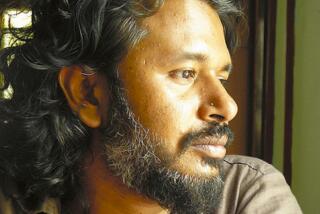The Turmoil of a Family--and a Country--in Transition : FUNNY BOY: by Shyam Selvadurai; Morrow; $23, 310 pages
With odd quiet and intimacy, the Sri Lanka novelist Shyam Selvadurai depicts a family’s agony on the fault line of a country cracking apart. And through the cycle of insurrection by the Tamil minority and repression by the Sinhalese majority, a child suffers his own insurrection: a gay identity that struggles to assert itself.
The novel begins and ends with a battle. At the start, Arjie, the younger son of a prosperous Tamil family in Colombo, insists on playing dress-up bridal games with his girl cousins instead of cricket with the boys. (The “funny boy,” as he is called to his puzzlement, always claims the part of the bride.) In the last chapter, several years later, Sinhalese rioters burn his house, his father’s hotel and his grandparents, who are trapped while driving by.
Each intervening chapter relates a personal or family vignette; each vignette is invaded and shaped by the disasters outside. The intention is valid; the effect is sometimes touching but often heavily maneuvered. Selvadurai’s talent shows best when he evokes the personal in its own terms. Although his account of the external horrors is adequate, he is clumsy at linking the two. His “War and Peace” has difficulty with the “and.”
This makes the unaffectedly personal first chapter the best. Arjie’s mother lets him watch her perform daily the art of subduing the float of a gauzy sari into a disciplined sheath. The beauty of the gesture and the safety of the intimacy inspire him to lead the girl cousins he plays with; he knows he does not belong with the boys and their rough games.
The family catches on, alarms sound, and Arjie is taken firmly in hand. No more attendance at his mother’s toilette, no more bridal games. Arjie battles valiantly for his world; the fight is comic, desolate and, for the time being, futile. A few years later, though, a crush on a schoolmate develops into something approaching a love affair, and Arjie begins to come to terms with the mysteries he has been carrying around inside himself.
In the following chapters, particular bits of damage from the Sinhalese-Tamil conflict intrude into the private dramas. Arjie’s father--who still believes in an integrated society--has to fire the son of an old Tamil friend because of protests from his Sinhalese employees.
Arjie’s aunt arrives from America as the chosen bride for a Tamil family friend. Free-spirited and rebellious, she falls for a Sinhalese fellow actor in an amateur production and prepares to elope with him. Then, on a train trip, she is savagely beaten by an anti-Tamil mob. She retreats into the clan. At the next rehearsal, she accuses her Sinhalese lover of throwing her down--a bit of stage business--too violently. It is one of the book’s most poignantly revealing moments. At the end, she marries the Tamil fiance. Arjie attends the wedding, conducted with the traditional splendor he loves; but he no longer loves it: “Something was missing.”
An almost identical line concludes another story. As a girl, Arjie’s mother, Ama, had wanted to marry a white neighbor; her family forbade it. Now an Australian journalist, the man returns to look into government violence against the Tamils in the southern city of Jaffna. He and Ama, whose husband is in Europe, conduct a passionate affair; later he is murdered. When Ama tries to investigate she runs up against an official cover-up and blackmail threats. She gives up; in the last scene she organizes a welcome-home party for her husband. It is lavish but to Arjie--once more proclaiming the degradation of the private by the public--”it all seems insubstantial.”
Here as elsewhere, Arjie is ever-present, placed at just the right window to overhear something crucial and available to deliver the message: Ethnic passion imposes itself on the fine and private values of civilization. In too much of his book, Selvadurai’s message imposes itself on the fine and private values of his writing.
More to Read
Sign up for our Book Club newsletter
Get the latest news, events and more from the Los Angeles Times Book Club, and help us get L.A. reading and talking.
You may occasionally receive promotional content from the Los Angeles Times.








